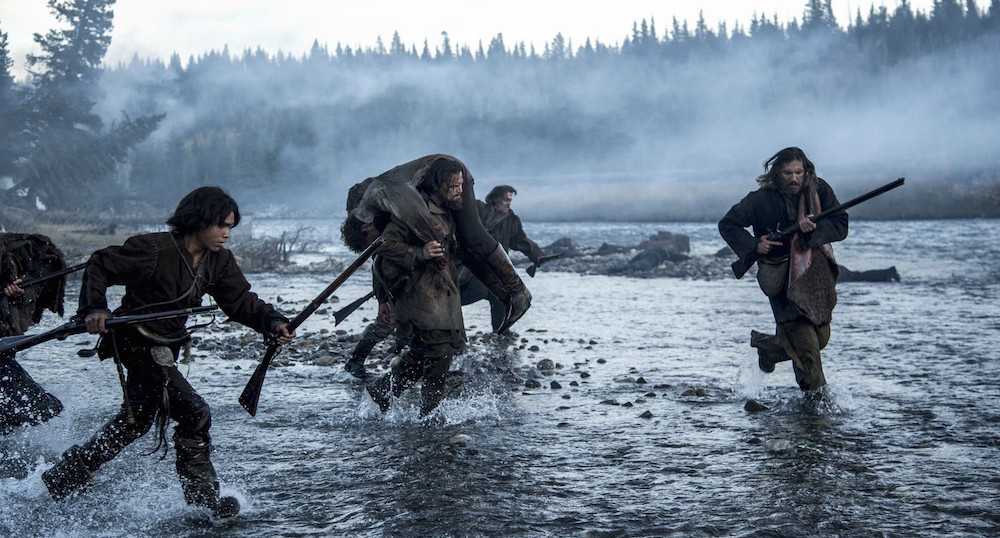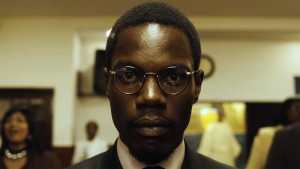
The Revenant is a movie that believes it is important. It is not.
Really, I can just leave it right there. I can expand on it, I can roll out my problems with it and my qualified praise as well, and I will, because this is a movie review, and that’s kinda the whole deal, but in short, that’s the movie. When you see The Revenant, what you are seeing is a movie in which a lot of very talented people worked very hard to create something that would enter the film canon immediately upon release, a piece of art that would have no delay between entrance into the world and placement in the pantheon. An awful lot of labor put towards a very clear goal. Unfortunately, that goal was not to create a great film; that goal was to create a Great Film, with the reception staunchly put before the cart or the horse you climb inside to keep you warm at night (tauntaun allusions unfortunate, but entirely unavoidable). I hate to break it to Alejandro González Iñárritu, but when you spend so much time carving your own plaque for the cinematic hall of fame, you’re not gonna have enough time to actually make something worth enshrining.
The Revenant follows, in an often pleasingly direct and simple way, the story of Hugh Glass (Leonardo DiCaprio), a fur trapper and frontiersman who, after being viciously attacked by a bear, is close to death. Volunteering to the rest of the party to stay behind with Glass, co-trapper John Fitzgerald (Tom Hardy) decides instead to kill Glass and ensure his own safety, free from the burden of the almost certainly dead man. While strangling Glass, Fitzgerald ends up also killing Glass’ own son who, understandably, isn’t down with the plan that leaves his father dead, and Fitzgerald and the other member of the group tasked with keeping Glass safe head off towards the rest of the party. Glass, stubbornly still alive after being left for dead and now bent on revenge, tracks Fitzgerald down across the frozen wilderness, pushing himself through suffering and death to once again see the face of his son’s killer. Along the way, there’s diversions and complications featuring French fur trappers, a native tribe seeking a lost daughter, a military encampment run by captain of the fur trading party Andrew Henry (Domhnall Gleeson), and the part where Leo eats a real liver, for real, he really did it guys. Give this man an Oscar (and give Andrew Zimmerman one too while you’re at it, he’s eaten so many kinds of balls I can’t even keep track anymore). In the end, revenge may or may not be had. No spoilers. But you know what happens even if you haven’t seen the film, trust me.
Mocking Leo aside, it should be said that The Revenant is not an awful movie, which is what I knee-jerk expected going in. It features all great performances (besides Leo, who is fine but who runs far too much on sheer physical effort instead of skill), often beautiful camera work, and a real sense of the wilderness it portrays. Anyone looking past those virtues is foolhardy in their desire to call the film bad. Instead, it’s an okay movie that clearly has designs on greatness that far outstrip its ability. Or, I suppose, it’s more accurate to say they far outstrip its desires or focus. It just doesn’t know what it wants to say, or if it did, it got muddied in a sea of look-at-me showmanship. Does it want to be Aguirre, a form a romantic existential crisis that paints nature as cruel, uncaring, and amoral? Is it a Malick-like meditation on America, attempting to turn The New World from a hazy portrait of harmony and disharmony into something more brutal and direct? Is it an I Saw the Devil-style commentary on brutal revenge and its futility? Is it like Valhalla Rising, but…not wait, it’s pretty much exactly Valhalla Rising. But like, if Valhalla Rising was just okay instead of amazing.
I have to assume this one’s on Iñárritu, as the entire production is immensely talented, but they’re not wrangled into anything cohesive. Instead of getting talent together and directing it towards a goal, he seems content to just let it hang there, doing whatever it wants, and when you give a virtuoso no direction you end up with what could charitably be described as wankery (see the guitar masturbators of the 80’s like Yngwie Malmsteen to see where that gets you). The Revenant repeatably calls so much attention to itself that it becomes totally distracting. The camera work is amazing–so amazing, in fact, that I never for a moment forgot there was a camera capturing all of it. Leo puts so much effort into his portrayal that he never falls into the character; he is always Actor Man, trying very hard, and he wants you to know as much. It tries to use length and repetition to create a sustained and heightened sense of emotion, but where great use of repetition (the band Fuck Buttons, for example) pushes to the very point where the audience will stop gaining new things and changes, The Revenant pushes way past that to the point where the repetition diminishes the things that worked earlier. The bear attack, for all its realism, pain, and intensity, never reaches the terror, menace, and suffocation of Backcountry, where the bear attack lasts a few minutes maximum and is shown only in frantic close-ups.
Again: it’s not a bad movie. Tom Hardy, in particular, nails his role, and besides the last twenty minutes or so of the second act it never feels its length. It’s fine entertainment. But it’s intensely frustrating, as under a heavier or more assured hand this movie easily becomes great. It calls out for someone with restraint to stitch it together, to tell Leo to back off on occasion, to tell Emmanuel Lubezki to just nail the damn camera down once in a while. Showing off looks bad on everyone, even some of the most talented artists working today. There are pieces that are incredibly worthwhile here, but as a whole The Revenant just doesn’t seem to know how to leverage its considerable skill into an actually meaningful or powerful film. Nearly freezing to death while making art is only noteworthy if the art itself has something to say.
—
The Revenant is currently playing in theaters.
Directed by Alejandro González Iñárritu; written by Mark L. Smith and Alejandro González Iñárritu based in part on the novel by Michael Punke; starring Leonardo DiCaprio, Tom Hardy, Domhnall Gleeson, Will Poulter, and Forrest Goodluck; 156 minutes.



 Derek
Derek
 Isabelle
Isabelle